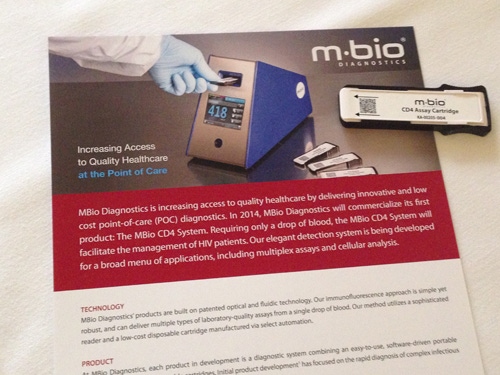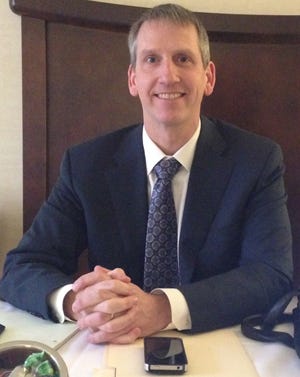Startup Developing Point-of-Care HIV-testing Device Seeks $15M
What if HIV patients and their doctors could know in roughly 25 minutes whether the disease has progressed instead of waiting a week to know test results?That is the promise of Boulder, Colorado-based diagnostic startup MBio and its founder and CEO Christopher Myatt.Myatt wants to bring rapid, point of care testing to complex diseases on which billions are spent globally in therapy and disease management.
February 6, 2014

The MBio cartridge seen right is inserted in the reader (shown in brochure) to enable rapid knowledge at the point of care of whether disease is progressing |
What if HIV patients and their doctors could know in roughly 25 minutes whether the disease has progressed instead of waiting a week to know test results?
That is the promise of Boulder, Colorado-based diagnostic startup MBio Diagnostics and its founder and CEO Christopher Myatt.
Myatt wants to bring rapid, point of care testing to complex diseases on which billions are spent globally in therapy and disease management.
|
Christopher Myatt, CEO of MBio |
To that end Myatt has built the CD4 system, incorporating a device and disposable cartridges that can count white blood cells from a single blood sample to know whether an HIV patient’s disease has progressed. That knowledge can help providers adjust or initiate therapy. The technology incorporates cell phone camera technology and DVD technology but is being applied in the medical context, Myatt says.
In the U.S. and some overseas locations, companies like Quest Diagnostics can take a blood sample, send it to their labs and get a test result for a count of white blood cells. Bt that kind of healthcare access is not as readily available in places like sub Saharan Africa.
And yet, it is in these places that have been ravaged by HIV, where immediate knowledge of a patient’s condition is needed given the volume of patients whose diseases need to be managed. Competing products aren’t able to manage that volume, Myatt says in a recent interview with MD+DI.
“People have developed other tests but they occupy the instrument for 35/40 min to an hour, so you might get 10 tests run in a day,” Myatt explains. “In Kenya, the HIV clinic day is on Tuesday.There are 30 people standing there in the morning on Tuesday. You better be able to handle that volume of clinic workflow.”
Allere makes such a point of care device. Myatt says that it is “a solid product but has low throughput” in that not many tests can run in any given time frame.
By contrast, MBio’s CD4 system can run a dozen tests in 25 minutes or so, Myatt declares. Further, the system has eliminated all the pumps and valves that current-day point-of-care devices have, he says. The cartridges with the blood sample incubate the test while the results can be read out through the read-out device, which cost a few thousand dollars, Myatt says.
Compare that to flow cytometry equipment that are also able to count cells from blood samples but are far more expensive.
“It’s a wonderful equipment but the cheapest ones are $30,000. Many of them are 100K, 300K,” Myatt says. “They require expertise, care and maintenance. People want to get away from that.”
That is why Myatt believes that there is a real market for his products, especially in low to middle income countries where people are more sensitive to cost and cannot easily access healthcare.
But HIV disease management through the CD$ system is only one application of the company’s technology. that MBio is developing.
Myatt looks at his company’s technology as a platform technology that can be used to diagnose tuberculosis and other infectious diseases globally and in the U.S. such as Hepatitis.
He has already raised $7 million from angels, including himself, and $20 million from the likes of National Institutes of Health as well as other government grants and partner grants.
Now MBio is seeking to raise $15 million from institutional investors. Given that U.S. venture capitalists do not yet see the potential of tackling global health challenges, Myatt is in discussions with European investors as well as well-known diagnostic companies. He also plans to announce a distribution agreement soon.
He hopes to win CE Mark on the CD4 system by September and launch his product in sub Saharan Africa this fall.
“ Its such a simple technology but it is powerful in what it can deliver,” Myatt says. “When point of care comes down in price to be as cost competitive as sending it out to Quest, you are going to have a whole new ball game.”
-- By Arundhati Parmar, Senior Editor, MD+DI
[email protected]
You May Also Like


.png?width=300&auto=webp&quality=80&disable=upscale)
